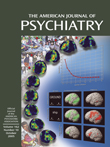Industry Sponsorship and Financial Conflict of Interest in the Reporting of Clinical Trials in Psychiatry
Abstract
OBJECTIVE: Financial conflict of interest has been reported to be prevalent in clinical trials in general medicine and associated with a greater likelihood of reporting results favorable to the intervention being studied. The extent and implications of industry sponsorship and financial conflict of interest in psychiatric clinical trials have not been investigated, to the authors’ knowledge. METHOD: The authors examined funding source and author financial conflict of interest in all clinical trials published in the American Journal of Psychiatry, the Archives of General Psychiatry, the Journal of Clinical Psychopharmacology, and the Journal of Clinical Psychiatry between 2001 and 2003. RESULTS: Among 397 clinical trials identified, 239 (60%) reported receiving funding from a pharmaceutical company or other interested party, and 187 studies (47%) included at least one author with a reported financial conflict of interest. Among the 162 randomized, double-blind, placebo-controlled studies examined, those that reported conflict of interest were 4.9 times more likely to report positive results; this association was significant only among the subset of pharmaceutical industry-funded studies. CONCLUSIONS: Author conflict of interest appears to be prevalent among psychiatric clinical trials and to be associated with a greater likelihood of reporting a drug to be superior to placebo.



